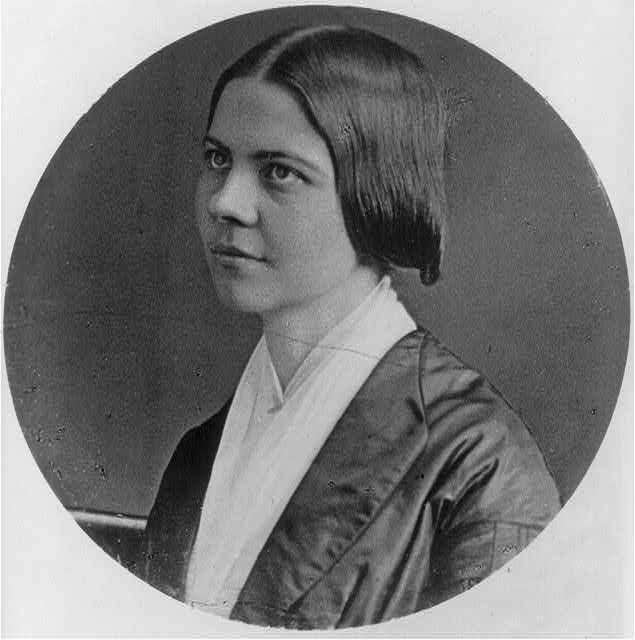

Queer Places:
Forest Hills Cemetery, 95 Forest Hills Ave, Jamaica Plain, MA 02130
 Lucy
Stone (August 13, 1818 – October 18, 1893) was a prominent U.S. orator,
abolitionist, and suffragist, and a vocal advocate and organizer promoting
rights for women.[1]
In 1847, Stone became the first woman from Massachusetts to earn a college
degree. She spoke out for women's rights and against slavery at a time when
women were discouraged and prevented from public speaking. Stone was known for
using her birth name after marriage, the custom being for women to take their
husband's surname.
Lucy
Stone (August 13, 1818 – October 18, 1893) was a prominent U.S. orator,
abolitionist, and suffragist, and a vocal advocate and organizer promoting
rights for women.[1]
In 1847, Stone became the first woman from Massachusetts to earn a college
degree. She spoke out for women's rights and against slavery at a time when
women were discouraged and prevented from public speaking. Stone was known for
using her birth name after marriage, the custom being for women to take their
husband's surname.
Stone's organizational activities for the cause of women's rights yielded tangible gains in the difficult political environment of the 19th century. Stone helped initiate the first National Women's Rights Convention in Worcester, Massachusetts[2] and she supported and sustained it annually, along with a number of other local, state and regional activist conventions. Stone spoke in front of a number of legislative bodies to promote laws giving more rights to women. She assisted in establishing the Woman's National Loyal League to help pass the Thirteenth Amendment and thereby abolish slavery, after which she helped form the American Woman Suffrage Association (AWSA), which built support for a woman suffrage Constitutional amendment by winning woman suffrage at the state and local levels.
Stone wrote extensively about a wide range of women's rights, publishing and distributing speeches by herself and others, and convention proceedings. In the long-running and influential[3] Woman's Journal, a weekly periodical that she founded and promoted, Stone aired both her own and differing views about women's rights. Called "the orator",[4] the "morning star"[5] and the "heart and soul"[6] of the women's rights movement, Stone influenced Susan B. Anthony to take up the cause of women's suffrage.[7] Elizabeth Cady Stanton wrote that "Lucy Stone was the first person by whom the heart of the American public was deeply stirred on the woman question."[8] Together, Anthony, Stanton, and Stone have been called the 19th-century "triumvirate" of women's suffrage and feminism.[9][10]
In the fall of 1846, Hannah Tracy Cutler received a letter from Stone at Oberlin College, with whom she had already developed a warm friendship. Stone had decided to become a women's rights reformer after graduating the following summer, and Tracy was one of several known advocates of women's rights from whom Stone sought advice on how to begin. Tracy cautioned that to make woman "both physically and intellectually man's equal" would require a societal revolution that would take at least a generation to accomplish. But saying that much could be done by one woman alone "if she possesses courage enough to act up to her convictions," Tracy advised "a quiet but thorough agitation" among the women at hand. And she asked, "Please write me again and let me know your plan, and also what I can do."[7]
Stone married Henry Blackwell when she was thirty-seven years old. Eight months later, the suffragist orator Antoinette Brown married Henry's brother, Samuel. Both of the women's careers in the suffrage movement came to a standstill for a long while.
They did not cease working because their husbands opposed suffrage. In fact, Henry Blackwell convinced Lucy Stone to marry him in 1855 by promising that he would work by her side for women's enfranchisement, and he was true to his word. Yet neither he nor Lucy could foresee her societally inculcated guilt, which the marriage brought to the surface. Lucy continued her active career in the suffrage movement right after her daughter, Alice, was born, in 1857. However, when she lost a second child in 1859, she became so anxious about Alice's well-being that she gave up her work for the next seven years in order to be a full-time mother. Though she was again an important figure in the suffrage movement by the end of the 1860s, Lucy's correspondence with her husband indicates that she felt uneasy because she was not a better homemaker. Henry Blackwell also felt guilty, as Alice reported after her mother died in 1893: "Papa ... has been blaming himself for marrying mamma at all. He says he spoiled her career." Whether Henry Blackwell's guilt was at all merited, Alice Stone Blackwell, who also became a suffrage activist, apparently believed that there was some justice in his self-accusation. She herself chose other women as her loves and never married.
In 1922 Elsie Hill, Chairman of the National Woman's Party, following her statement that she would retain her own name although married to Professor Albert Levitt of the University of North Dakota, received an invitation to join the Lucy Stone League of New York.
My published books: